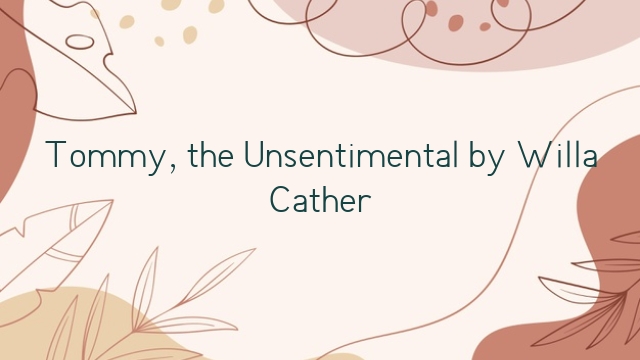
Tommy, the Unsentimental by Willa Cather
“Your father says he has no business tact at all, and of course that’s dreadfully unfortunate.”
“Business,” replied Tommy, “he’s a baby in business; he’s good for nothing on earth but to keep his hair parted straight and wear that white carnation in his buttonhole. He has ‘em sent down from Hastings twice a week as regularly as the mail comes, but the drafts he cashes lie in his safe until they are lost, or somebody finds them. I go up occasionally and send a package away for him myself. He’ll answer your notes promptly enough, but his business lettersI believe he destroys them unopened to shake the responsibility of answering them.”
“I am at a loss to see how you can have such patience with him, Tommy, in so many ways he is thoroughly reprehensible.”
“Well, a man’s likeableness don’t depend at all on his virtues or acquirements, nor a woman’s either, unfortunately. You like them or you don’t like them, and that’s all there is to it. For the why of it you must appeal to a higher oracle than I. Jay is a likeable fellow, and that’s his only and sole acquirement, but after all it’s a rather happy one.”
“Yes, he certainly is that,” replied Miss Jessica, as she deliberately turned off the gas jet and proceeded to arrange her toilet articles. Tommy watched her closely and then turned away with a baffled expression.
Needless to say, Tommy was not a boy, although her keen gray eyes and wide forehead were scarcely girlish, and she had the lank figure of an active half grown lad. Her real name was Theodosia, but during Thomas Shirley’s frequent absences from the bank she had attended to his business and correspondence signing herself “T. Shirley,” until everyone in Southdown called her “Tommy.” That blunt sort of familiarity is not unfrequent in the West, and is meant well enough. People rather expect some business ability in a girl there, and they respect it immensely. That, Tommy undoubtedly had, and if she had not, things would have gone at sixes and sevens in the Southdown National. For Thomas Shirley had big land interests in Wyoming that called him constantly away from home, and his cashier, little Jay Ellington Harper, was, in the local phrase, a weak brother in the bank. He was the son of a friend of old Shirley’s, whose papa had sent him West, because he had made a sad mess of his college career, and had spent too much money and gone at too giddy a pace down East. Conditions changed the young gentleman’s life, for it was simply impossible to live either prodigally or rapidly in Southdown, but they could not materially affect his mental habits or inclinations. He was made cashier of Shirley’s bank because his father bought in half the stock, but Tommy did his work for him.
The relation between these two young people was peculiar; Harper was, in his way, very grateful to her for keeping him out of disgrace with her father, and showed it by a hundred little attentions which were new to her and much more agreeable than the work she did for him was irksome. Tommy knew that she was immensely fond of him, and she knew at the same time that she was thoroughly foolish for being so. As she expressed it, she was not of his sort, and never would be. She did not often take pains to think, but when she did she saw matters pretty clearly, and she was of a peculiarly unfeminine mind that could not escape meeting and acknowledging a logical conclusion. But she went on liking Jay Ellington Harper, just the same. Now Harper was the only foolish man of Tommy’s acquaintance. She knew plenty of active young business men and sturdy ranchers, such as one meets about live western towns, and took no particular interest in them, probably just because they were practical and sensible and thoroughly of her own kind. She knew almost no women, because in those days there were few women in Southdown who were in any sense interesting, or interested in anything but babies and salads. Her best friends were her father’s old business friends, elderly men who had seen a good deal of the world, and who were very proud and fond of Tommy. They recognized a sort of squareness and honesty of spirit in the girl that Jay Ellington Harper never discovered, or, if he did, knew too little of its rareness to value highly. Those old speculators and men of business had always felt a sort of responsibility for Tom Shirley’s little girl, and had rather taken her mother’s place, and been her advisers on many points upon which men seldom feel at liberty to address a girl.
She was just one of them; she played whist and billiards with them, and made their cocktails for them, not scorning to take one herself occasionally. Indeed, Tommy’s cocktails were things of fame in Southdown, and the professional compounders of drinks always bowed respectfully to her as though acknowledging a powerful rival.
Now all these things displeased and puzzled Jay Ellington Harper, and Tommy knew it full well, but clung to her old manner of living with a stubborn pertinacity, feeling somehow that to change would be both foolish and disloyal to the Old Boys. And as things went on, the seven Old Boys made greater demands upon her time than ever, for they were shrewd men, most of them, and had not lived fifty years in this world without learning a few things and unlearning many more. And while Tommy lived on in the blissful delusion that her role of indifference was perfectly played and without a flaw, they suspected how things were going and were perplexed as to the outcome. Still, their confidence was by no means shaken, and as Joe Elsworth said to Joe Sawyer one evening at billiards, “I think we can pretty nearly depend on Tommy’s good sense.”
They were too wise to say anything to Tommy, but they said just a word or two to Thomas Shirley, Sr., and combined to make things very unpleasant for Mr. Jay Ellington Harper.
At length their relations with Harper became so strained that the young man felt it would be better for him to leave town, so his father started him in a little bank of his own up in Red Willow. Red Willow, however, was scarcely a safe distance, being only some twenty-five miles north, upon the Divide, and Tommy occasionally found excuse to run up on her wheel to straighten out the young man’s business for him. So when she suddenly decided to go East to school for a year, Thomas, Sr., drew a sigh of great relief. But the seven Old Boys shook their heads; they did not like to see her gravitating toward the East; it was a sign of weakening, they said, and showed an inclination to experiment another kind of life, Jay Ellington Harper’s kind.
But to school Tommy went, and from all reports conducted herself in a most seemly manner; made no more cocktails, played no more billiards. She took rather her own way with the curriculum, but she distinguished herself in athletics, which in Southdown counted for vastly more than erudition.
Her evident joy on getting back to Southdown was appreciated by everyone. She went about shaking hands with everybody, her shrewd face, that was so like a clever wholesome boy’s, held high with happiness. As she said to old Joe Elsworth one morning, when they were driving behind his stud through a little thicket of cottonwood scattered along the sun-parched bluffs, “It’s all very fine down East there, and the hills are great, but one gets mighty homesick for this sky, the old intense blue of it, you know. Down there the skies are all pale and smoky. And this wind, this hateful, dear, old everlasting wind that comes down like the sweep of cavalry and is never tamed or broken, O Joe, I used to get hungry for this wind! I couldn’t sleep in that lifeless stillness down there.”
“How about the people, Tom?”
“O, they are fine enough folk, but we’re not their sort, Joe, and never can be.”
“You realize that, do you, fully?”
“Quite fully enough, thank you, Joe.” She laughed rather dismally, and Joe cut his horse with the whip.
The only unsatisfactory thing about Tommy’s return was that she brought with her a girl she had grown fond of at school, a dainty, white languid bit of a thing, who used violet perfumes and carried a sunshade. The Old Boys said it was a bad sign when a rebellious girl like Tommy took to being sweet and gentle to one of her own sex, the worst sign in the world.
The new girl was no sooner in town than a new complication came about. There was no doubt of the impression she made on Jay Ellington Harper. She indisputably had all those little evidences of good breeding that were about the only things which could touch the timid, harassed young man who was so much out of his element. It was a very plain case on his part, and the souls of the seven were troubled within them. Said Joe Elsworth to the other Joe, “The heart of the cad is gone out to the little muff, as is right and proper and in accordance with the eternal fitness of things. But there’s the other girl who has the blindness that may not be cured, and she gets all the rub of it. It’s no use, I can’t help her, and I am going to run down to Kansas City for awhile. I can’t stay here and see the abominable suffering of it.” He didn’t go, however.
There was just one other person who understood the hopelessness of the situation quite as well as Joe, and that was Tommy. That is, she understood Harper’s attitude. As to Miss Jessica’s she was not quite so certain, for Miss Jessica, though pale and languid and addicted to sunshades, was a maiden most discreet. Conversations on the subject usually ended without any further information as to Miss Jessica’s feelings, and Tommy sometimes wondered if she were capable of having any at all.
At last the calamity which Tommy had long foretold descended upon Jay Ellington Harper. One morning she received a telegram from him begging her to intercede with her father; there was a run on his bank and he must have help before noon. It was then ten thirty, and the one sleepy little train that ran up to Red Willow daily had crawled out of the station an hour before. Thomas Shirley, Sr., was not at home.
“And its a good thing for Jay Ellington he’s not, he might be more stony hearted than I,” remarked Tommy, as she closed the ledger and turned to the terrified Miss Jessica. “Of course we’re his only chance, no one else would turn their hand over to help him. The train went an hour ago and he says it must be there by noon. It’s the only bank in the town, so nothing can be done by telegraph. There is nothing left but to wheel for it. I may make it, and I may not. Jess, you scamper up to the house and get my wheel out, the tire may need a little attention. I will be along in a minute.”
“O, Theodosia, can’t I go with you? I must go!”
“You go! O, yes, of course, if you want to. You know what you are getting into, though. It’s twenty-five miles uppish grade and hilly, and only an hour and a quarter to do it in.”
“O, Theodosia, I can do anything now!” cried Miss Jessica, as she put up her sunshade and fled precipitately. Tommy smiled as she began cramming bank notes into a canvas bag. “May be you can, my dear, and may be you can’t.”
The road from Southdown to Red Willow is not by any means a favorite bicycle road; it is rough, hilly and climbs from the river bottoms up to the big Divide by a steady up grade, running white and hot through the scorched corn fields and grazing lands where the long-horned Texan cattle browse about in the old buffalo wallows. Miss Jessica soon found that with the pedaling that had to be done there was little time left for emotion of any sort, or little sensibility for anything but the throbbing, dazzling heat that had to be endured. Down there in the valley the distant bluffs were vibrating and dancing with the heat, the cattle, completely overcome by it, had hidden under the shelving banks of the “draws” and the prairie dogs had fled to the bottom of their holes that are said to reach to water. The whirr of the seventeen-year locust was the only thing that spoke of animation, and that ground on as if only animated and enlivened by the sickening, destroying heat. The sun was like hot brass, and the wind that blew up from the south was hotter still. But Tommy knew that wind was their only chance. Miss Jessica began to feel that unless she could stop and get some water she was not much longer for this vale of tears. She suggested this possibility to Tommy, but Tommy only shook her head, “Take too much time,” and bent over her handle bars, never lifting her eyes from the road in front of her. It flashed upon Miss Jessica that Tommy was not only very unkind, but that she sat very badly on her wheel and looked aggressively masculine and professional when she bent her shoulders and pumped like that. But just then Miss Jessica found it harder than ever to breathe, and the bluffs across the river began doing serpentines and skirt dances, and more important and personal considerations occupied the young lady.
When they were fairly over the first half of the road, Tommy took out her watch. “Have to hurry up, Jess, I can’t wait for you.”
“O, Tommy, I can’t,” panted Miss Jessica, dismounting and sitting down in a little heap by the roadside. “You go on, Tommy, and tell himtell him I hope it won’t fail, and I’d do anything to save him.”
By this time the discreet Miss Jessica was reduced to tears, and Tommy nodded as she disappeared over the hill laughing to herself. “Poor Jess, anything but the one thing he needs. Well, your kind have the best of it generally, but in little affairs of this sort my kind come out rather strongly. We’re rather better at them than at dancing. It’s only fair, one side shouldn’t have all.”
Just at twelve o’clock, when Jay Ellington Harper, his collar crushed and wet about his throat, his eyeglass dimmed with perspiration, his hair hanging damp over his forehead, and even the ends of his moustache dripping with moisture, was attempting to reason with a score of angry Bohemians, Tommy came quietly through the door, grip in hand. She went straight behind the grating, and standing screened by the bookkeeper’s desk, handed the bag to Harper and turned to the spokesman of the Bohemians.
“What’s all this business mean, Anton? Do you all come to bank at once nowadays?”
“We want ‘a money, want ‘a our money, he no got it, no give it,” bawled the big beery Bohemian.
“O, don’t chaff ‘em any longer, give ‘em their money and get rid of ‘em, I want to see you,” said Tommy carelessly, as she went to the consulting room.
When Harper entered half an hour later, after the rush was over, all that was left of his usual immaculate appearance was his eyeglass and the white flower in his buttonhole.
“This has been terrible!” he gasped. “Miss Theodosia, I can never thank you.”
“No,” interrupted Tommy. “You never can, and I don’t want any thanks. It was rather a tight place, though, wasn’t it? You looked like a ghost when I came in. What started them?”
“How should I know? They just came down like the wolf on the fold. It sounded like the approach of a ghost dance.”*
“And of course you had no reserve? O, I always told you this would come, it was inevitable with your charming methods. By the way, Jess sends her regrets and says she would do anything to save you. She started out with me, but she has fallen by the wayside. O, don’t be alarmed, she is not hurt, just winded. I left her all bunched up by the road like a little white rabbit. I think the lack of romance in the escapade did her up about as much as anything; she is essentially romantic. If we had been on fiery steeds bespattered with foam I think she would have made it, but a wheel hurt her dignity. I’ll tend bank; you’d better get your wheel and go and look her up and comfort her. And as soon as it is convenient, Jay, I wish youd marry her and be done with it, I want to get this thing off my mind.”
Jay Ellington Harper dropped into a chair and turned a shade whiter.
“Theodosia, what do you mean? Don’t you remember what I said to you last fall, the night before you went to school? Don’t you remember what I wrote you”
Tommy sat down on the table beside him and looked seriously and frankly into his eyes.
“Now, see here, Jay Ellington, we have been playing a nice little game, and now it’s time to quit. One must grow up sometime. You are horribly wrought up over Jess, and why deny it? She’s your kind, and clean daft about you, so there is only one thing to do. That’s all.”
Jay Ellington wiped his brow, and felt unequal to the situation.
Perhaps he really came nearer to being moved down to his stolid little depths than he ever had before. His voice shook a good deal and was very low as he answered her.
“You have been very good to me, I didn’t believe any woman could be at once so kind and clever. You almost made a man of even me.”
“Well, I certainly didn’t succeed. As to being good to you, that’s rather a break, you know; I am amiable, but I am only flesh and blood after all. Since I have known you I have not been at all good, in any sense of the word, and I suspect I have been anything but clever. Now take mercy upon Jessand meand go. Go on, that ride is beginning to tell on me. Such things strain one’s nerve…. Thank Heaven he’s gone at last and had sense enough not to say anything more. It was growing rather critical. As I told him I am not at all superhuman.”
After Jay Ellington Harper had bowed himself out, when Tommy sat alone in the darkened office, watching the flapping blinds, with the bank books before her, she noticed a white flower on the floor. It was the one Jay Ellington Harper had worn in his coat and had dropped in his nervous agitation. She picked it up and stood holding it a moment, biting her lip. Then she dropped it into the grate and turned away, shrugging her thin shoulders.
“They are awful idiots, half of them, and never think of anything beyond their dinner. But O, how we do like ‘em!”





